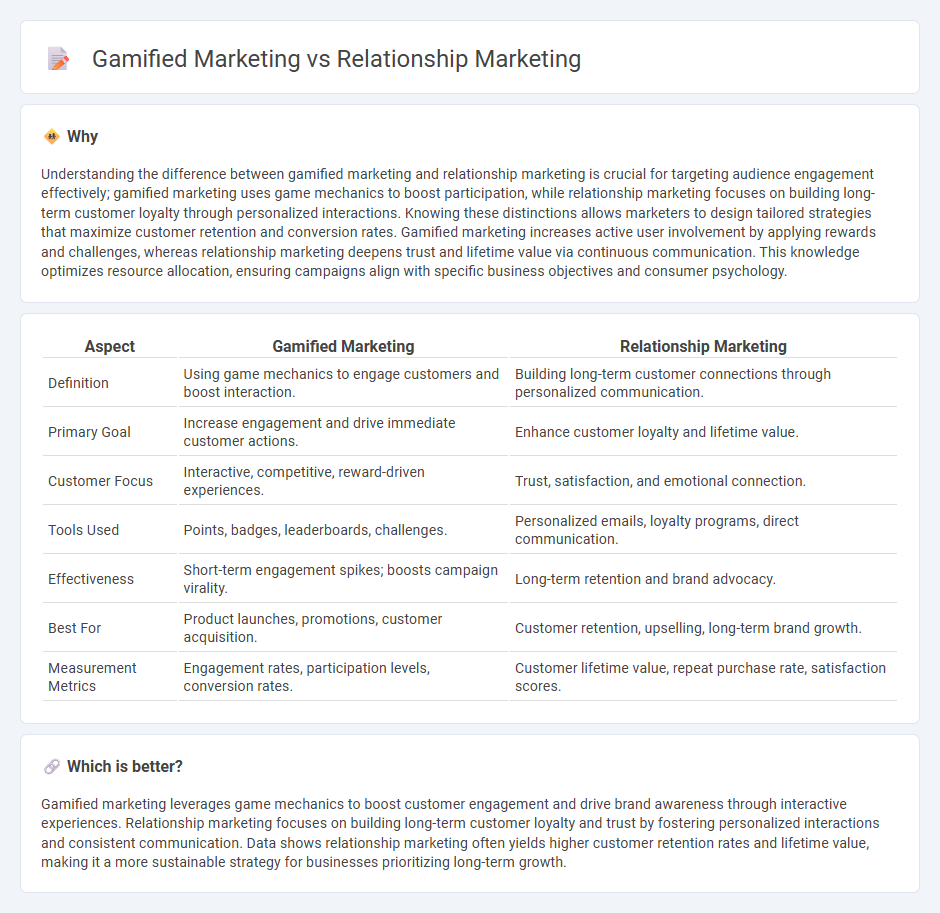
Gamified marketing leverages game design elements to boost customer engagement, increase brand awareness, and drive behavioral outcomes through interactive experiences. Relationship marketing focuses on building long-term customer loyalty by fostering personalized communication, trust, and value-driven interactions. Explore the distinct strategies and benefits of gamified marketing versus relationship marketing to enhance your brand's growth.
Why it is important
Understanding the difference between gamified marketing and relationship marketing is crucial for targeting audience engagement effectively; gamified marketing uses game mechanics to boost participation, while relationship marketing focuses on building long-term customer loyalty through personalized interactions. Knowing these distinctions allows marketers to design tailored strategies that maximize customer retention and conversion rates. Gamified marketing increases active user involvement by applying rewards and challenges, whereas relationship marketing deepens trust and lifetime value via continuous communication. This knowledge optimizes resource allocation, ensuring campaigns align with specific business objectives and consumer psychology.
Comparison Table
| Aspect | Gamified Marketing | Relationship Marketing |
|---|---|---|
| Definition | Using game mechanics to engage customers and boost interaction. | Building long-term customer connections through personalized communication. |
| Primary Goal | Increase engagement and drive immediate customer actions. | Enhance customer loyalty and lifetime value. |
| Customer Focus | Interactive, competitive, reward-driven experiences. | Trust, satisfaction, and emotional connection. |
| Tools Used | Points, badges, leaderboards, challenges. | Personalized emails, loyalty programs, direct communication. |
| Effectiveness | Short-term engagement spikes; boosts campaign virality. | Long-term retention and brand advocacy. |
| Best For | Product launches, promotions, customer acquisition. | Customer retention, upselling, long-term brand growth. |
| Measurement Metrics | Engagement rates, participation levels, conversion rates. | Customer lifetime value, repeat purchase rate, satisfaction scores. |
Which is better?
Gamified marketing leverages game mechanics to boost customer engagement and drive brand awareness through interactive experiences. Relationship marketing focuses on building long-term customer loyalty and trust by fostering personalized interactions and consistent communication. Data shows relationship marketing often yields higher customer retention rates and lifetime value, making it a more sustainable strategy for businesses prioritizing long-term growth.
Connection
Gamified marketing enhances customer engagement by incorporating game mechanics, which strengthens emotional connections and loyalty central to relationship marketing. Both strategies focus on creating interactive and personalized experiences that drive long-term customer retention and brand advocacy. Integrating gamification techniques into relationship marketing campaigns boosts customer participation and deepens trust through rewarding interactions.
Key Terms
**Relationship marketing:**
Relationship marketing emphasizes building long-term customer loyalty through personalized communication, trust development, and consistent engagement, fostering deeper emotional connections with the brand. Key strategies include customer feedback loops, loyalty programs, and tailored content that enhance customer lifetime value and advocacy. Explore how relationship marketing drives sustainable business growth and strengthens brand-consumer bonds.
Customer Retention
Relationship marketing emphasizes building long-term customer loyalty through personalized interactions and trust, fostering emotional connections that encourage repeat business. Gamified marketing uses game design elements like points, rewards, and challenges to engage customers actively, increasing retention by enhancing user experience and motivation. Explore deeper insights on how these strategies can boost customer retention effectively.
Personalization
Relationship marketing centers on personalized communication that builds long-term customer loyalty through tailored content and exclusive offers. Gamified marketing uses interactive, game-like elements to enhance personalization by engaging customers in unique and rewarding experiences based on their preferences and behaviors. Explore how integrating personalization in both strategies can optimize customer engagement and retention.
Source and External Links
What Is Relationship Marketing? | Definition from TechTarget - Relationship marketing focuses on building customer loyalty and long-term engagement by creating strong emotional connections to a brand, contrasting with transactional marketing that targets individual sales; it helps retain customers, understand their needs, and generate ongoing business.
Relationship Marketing: 5 Ways to Create Lifelong Customers - Relationship marketing builds close emotional ties with customers through purpose-driven connections, brand communities, customer feedback, and exclusive offers, increasing customer spend and loyalty even beyond consumer-facing companies into B2B contexts.
Relationship Marketing: The Ultimate Guide | Referral Rock Blog - Relationship marketing is a strategy aimed at customer retention, satisfaction, and lifetime value by fostering emotional connections, open communication, personalized experiences, and loyalty programs, which significantly drive revenue growth and reduce costs by focusing on repeat customers.
 dowidth.com
dowidth.com